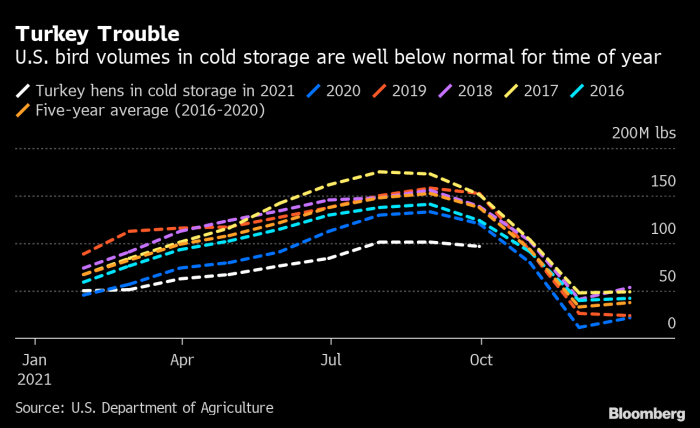Thanksgiving is almost here, and food pantries always get busier around the holidays. But this season, for Pantry 279 in Ellettsville, that rings even truer, as cars lined up around the block this week to receive boxes of food put together by the pantry. On any given week throughout the year, the pantry can serve hundreds of families, and at times, over 1,000. It’s a regional hub for over 30 surrounding counties, and one of the most productive food pantries in all of southern Indiana.
This year has presented a much more difficult challenge, though, as meat prices have soared, making the traditional Thanksgiving turkey and option not feasible for every family. Some are turning to alternative meats, like chicken or pork roast to put on their tables this holiday.
In a normal year, Pantry 279 director Cindy Chavez says she’ll start at the big grocery chains in Bloomington to buy pallets of turkeys to fill out their Thanksgiving boxes. Then, once she’s maxed out on sales in town, she’ll start working her way up to Indianapolis, where she finished out her several-thousand turkey-buying campaign. This year though, stores gave her a different answer.
“Straight across the board, it’s been ‘we can only give you two turkeys,'” Chavez said.
Multiple studies have shown turkey prices in the U.S. are as high as they’ve ever been. The graph below from the U.S. Department of Agriculture shows how few turkeys are available compared to previous years.
And the high prices don’t stop with just meat. With the supply chain shortages nationwide, the meal cost overall, right down to the ingredients to put in your pumpkin pie, is up more than 20% from last year, which was the lowest in nearly a decade for a family of 10.
That still hasn’t stopped Chavez, who’s determined to feed as many in the local community as she possibly can.
“There just aren’t many food pantries around us,” Chavez said. “That’s why this pantry was started seven years ago, and it definitely fills a need, because nobody else was picking up the slack.”
Chavez also said providing families with food isn’t necessarily just about physical nourishment–it’s about taking care of their mental health too. And, like many other things, that’s something COVID-19 played a role in last year.
“Not having people over impacts some people dramatically,” Chavez said. “That once- or twice-a-year bonding moment at Thanksgiving or Christmas is really important, and you don’t realize how important it is until you go without it.”
Simply having to ask for food can be a damaging emotional experience as well, and one most people don’t think about.
“We are allowing them to have the food to invite their friends and family and not go through the non-dignity of saying ‘I’m sorry, I can’t afford food, would you mind bringing some over?'” Chavez said.
Overall, Chavez said it’s the people that keep her and the rest of the team going, and she’s reminded by visitors every day that the impact the pantry has on families is real. Her full interview with IU NewsNet can be seen below.

